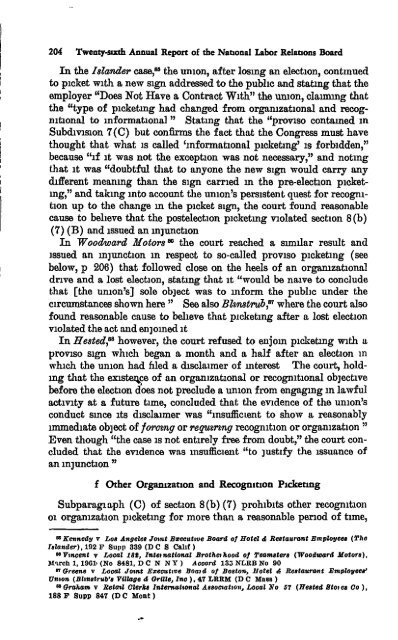TWENTY-SIXTH ANNUAL REPORT - National Labor Relations Board
TWENTY-SIXTH ANNUAL REPORT - National Labor Relations Board
TWENTY-SIXTH ANNUAL REPORT - National Labor Relations Board
You also want an ePaper? Increase the reach of your titles
YUMPU automatically turns print PDFs into web optimized ePapers that Google loves.
204 Twenty-sixth Annual Report of the <strong>National</strong> <strong>Labor</strong> <strong>Relations</strong> <strong>Board</strong><br />
In the Islander camp the union, after losing an election, continued<br />
to picket with a new sign addressed to the public and stating that the<br />
employer "Does Not Have a Contract With" the union, claiming that<br />
the "type of picketing had changed from organizational and recognitional<br />
to informational" Stating that the "proviso contained in<br />
Subdivision 7(C) but confirms the fact that the Congress must have<br />
thought that what is called 'informational picketing' is forbidden,"<br />
because "if it was not the exception was not necessary," and noting<br />
that it was "doubtful that to anyone the new sign would carry any<br />
different meaning than the sign carried in the pre-election picketing,"<br />
and taking into account the union's persistent quest for recognition<br />
up to the change in the picket sign, the court found reasonable<br />
cause to believe that the postelection picketing violated section 8(b)<br />
(7) (B) and issued an injunction<br />
In Woodward Motors 8° the court reached a similar result and<br />
issued an injunction in respect to so-called proviso picketing (see<br />
below, p 206) that followed close on the heels of an orgamzational<br />
drive and a lost election, stating that it "would be naive to conclude<br />
that [the union's] sole object was to inform the public under the<br />
circumstances shown here" See also Blinstrub," where the court also<br />
found reasonable cause to believe that picketing after a lost election<br />
violated the act and enjoined it<br />
In II ested,88 however, the court refused to enjoin picketing with a<br />
proviso sign which began a month and a half after an election in<br />
which the union had filed a disclaimer of interest The court, holding<br />
that the existe4.ce of an organizational or recogmtional objective<br />
before the election does not preclude a union from engaging in lawful<br />
activity at a future time, concluded that the evidence of the union's<br />
conduct since its disclaimer was "insufficient to show a reasonably<br />
immediate object of forcing or requiring recognition or organization"<br />
Even though "the case is not entirely free from doubt," the court concluded<br />
that the evidence was insufficient "to justify the issuance of<br />
an injunction"<br />
f Other Organization and Recognition Picketing<br />
Subparagiaph (C) of section 8(b) (7) prohibits other recognition<br />
oi organization picketing for more than a reasonable period of time,<br />
85 Kennedy v Los Angeles Joint Executive <strong>Board</strong> of Hotel 5 Restaurant Employees (The<br />
Islander), 192 F Bugg 339 (D C S Calif)<br />
el Vincent v Local 182, Intonational Brothc hood of Teamsters (Woodward Motors),<br />
Wirch 1, 1901, (No 8481, DC N NY) Accord 135 NLRB No 90<br />
87 Greene v Local Joint Executive Boat d of Boston, Hotel d Restaurant Employees'<br />
Union (Blinstrub's Village d Grille, Inc ), 47 LRRM (D C Mass )<br />
Se Graham v Retasl Clerks International Association, Local No 57 (Flested Stoics Co ),<br />
188 F Sum) 847 (DC Mont )

















